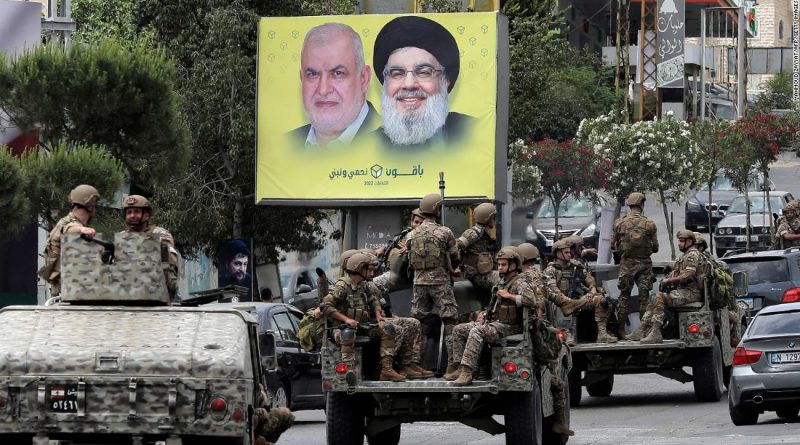Will Hezbollah’s election setback change anything in Lebanon?
This worked against Lebanon’s most powerful political party. When Hezbollah’s bloc lost a majority that underpinned the last four years of Lebanese politics, it was an unusual setback.
The group had gotten used to victory over the years. In 2000, it drove Israeli forces out of southern Lebanon after 22 years of occupation. In 2006, it held its ground in a war against Israel when Israel sought to disarm the group. During Syria’s civil war, it successfully intervened on behalf of Syrian President Bashar al-Assad and helped bolster his defenses after the dictator violently quashed a popular uprising against his rule. The group’s political influence appeared to be on a relentless rise, despite a domestic bid — backed by Saudi Arabia — to curb the group’s power that was rapidly extending beyond Lebanon.
But the weekend’s election marked a reversal of fortunes. While the parliamentary makeup of Hezbollah and its Shia ally, Amal, remains intact, a number of the group’s allies were unseated or beaten, mostly by reformists.
The country is at a crossroads. It could experience more of the instability that of the last nearly two-decades: a series of deadlocks that exact huge losses on the Lebanese economy. On the other hand, the new parliament also raises the specter of what had previously been unimaginable — a political retreat by Hezbollah.
That is a move that critics of the group, as well as some of its supporters, would like to see. Hezbollah should be pleased it lost its “illusory majority” in parliament, said pro-Hezbollah analyst Salem Zahran in an interview with Lebanese broadcaster LBC on Tuesday. Establishing a political distance from the spiraling crisis could help Hezbollah bolster its popularity, he said.
Other analysts say a political withdrawal could also facilitate a government formation process that is currently underway and ward off further turbulence.
“It can be an opportunity for Hezbollah to concede tactically for some kind of economic recovery that buys this country some time,” said University of London researcher Ibrahim Halawi. “Because otherwise it’s a stalemate and it will be very costly on a system that is already feeling the burden of the economic crisis.”
Either way, the larger implications of last weekend’s vote are clear. Overwhelmingly, observers see the election as an indictment of a political elite that includes both Hezbollah’s coalition and its traditional rivals. Whether Lebanon’s leaders will address that and change course will determine the country’s fate.
CNN’s Ben Wedeman and Charbel Mallo contributed reporting
The digest
Clashes erupt in Libya as parliament-appointed prime minister tries to take over the capital
Violence engulfed Libya’s capital on Tuesday when parliament-appointed Prime Minister Fathi Bashagha tried to take over the government in Tripoli, but was forced back by UN-backed Prime Minister Abdulhamid al-Dbeibah and his rival administration, which refuses to cede power.
- Background: After two months of stalemate between Libya’s rival administrations in the east and the west of the country, Bashagha tried to enter Tripoli overnight but withdrew after fighting broke out. Bashagha had said he would not use violence to take over the capital.
- Why it matters: The violence between both administrations brings back memories of a partitioned Libya, which saw deadly fighting in 2020 when then-commander of the east Khalifa Haftar launched an attack on the capital, west of the country. The current political deadlock has also already led to a partial blockade of Libya’s oil facilities, slashing the country’s main source of foreign revenue in half.
Iran state TV airs footage of French couple accused of spying
Iran’s state television on Tuesday showed what it described as details of the arrest of two French citizens earlier this month, saying they were spies who had sought to stir up unrest.
- Background: Iran said it had arrested two Europeans for allegedly fomenting unrest “by organizing trade union protests.” France has condemned their detention as baseless and demanded their immediate release.
- Why it matters: The incident is likely to complicate ties between Iran and France as wider talks on reviving a nuclear deal stall. Two other French nationals are being held in Iran on national security charges.
At least 70 injured as Palestinians and Israeli police clash around funeral
At least 20 people were arrested around violent clashes between Palestinians and Israeli forces in East Jerusalem on Monday night, including five suspects in an attempted car ramming event, Israel Police said on Tuesday. The Palestinian Red Crescent said on Monday that 71 Palestinians were injured during the clashes, which took place around a funeral.
- Background: Six police officers were injured during the confrontations on Monday, including two who required medical treatment, Israeli police said. The violence erupted around the funeral of Walid Al-Sharif, 23, who died on Saturday in hospital from injuries sustained during unrest at Jerusalem’s Al Aqsa mosque compound last month.
- Why it matters: The violence came just days after clashes between Israeli forces and Palestinians at the funeral of Al Jazeera journalist Shireen Abu Akleh. Abu Akleh was shot in the head in the West Bank as she covered an Israeli military raid.
What to watch
“Sexual violence is a weapon of war to destroy communities,” says Iraqi Yazidi activist Nadia Murad, who is working to make sure oppressive regimes are held accountable for their crimes.
Watch her interview here:
Around the region
Britain’s colonial past is making its way back to public debate as Libya demands the return of what experts say are 1,800-year-old marbles currently adorning a park owned by the British Crown.
The marbles today make up the Temple of Augustus in Windsor Great Park, a royal estate in Berkshire, England. But like many artifacts held by former colonial powers, the marbles are not originally from the UK.
The architectural structures were initially built in Leptis Magna, a Phoenician settlement on the north coast of Africa, in what is today modern Libya, Josephine Quinn, professor of ancient history at Oxford University told CNN, adding that they date as far back as 1,800 years.
The UN-backed Libyan Government of National Unity has not taken the case to court, but has sent letters through its lawyer to the Crown Estate informing them of their demands, according to Mohamed Shaban, a London-based lawyer tasked with the case.
“So far, my instructions are to go easy and to simply start a dialogue for the purpose of reaching an amicable settlement with the Crown,” Shaban told CNN.
“The Crown’s lawyers have simply sent polite holding letters but nothing substantive,” he said, adding that “nothing is off the table be it litigation in the English courts or mediation via UNESCO mediation services.” The Leptis Magna site in Libya was designated a UNESCO World Heritage site in 1982.
The Crown Estate told CNN that the Leptis Magna columns “were installed at Virginia Water in the early 1800s,” and that they “remain on public display and are an important and valued feature of the Virginia Water landscape.”
“They continue to be enjoyed by the millions of visitors to Windsor Great Park each year,” the Estate added.
Leptis Magna and the marbles taken from the site have “shaped the Libyan identity,” said Hafed Walda, a UK-based Libyan archaeologist who supports their return. Libya’s cities are home to several Roman-era structures, many dating back to the 2nd century CE.
By Nadeen Ebrahim




